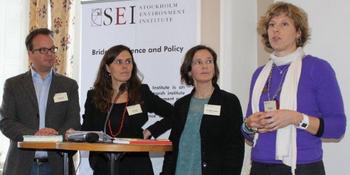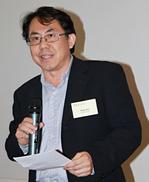Team Leader: International Climate Risk and Adaptation; Senior Research Fellow
SEI Headquarters
SEI Affiliated Researcher

The topics ranged from planetary boundaries and changing geopolitics, to pesticide use in Cambodia, to consumption-based emissions accounting. The programme was deliberately broad and diverse, and even within each session – on, say, the distribution of water, or Sweden’s track record as an environmental leader – presented strikingly different perspectives.
The goal, says organiser Åsa Persson, was “to put our ideas and knowledge at centre stage and give researchers a chance to get a wide range of peer feedback, not just from their closest colleagues.”
SEI staff participate in scores of conferences, seminars and policy discussions each year, but seldom do they come together, as a group, to discuss one another’s work, especially across disciplines. As an important step in trying to change this, researchers at SEI’s Stockholm Centre decided to hold a forum on 24 and 25 January to foster internal communication.

More than 60 Stockholm-based researchers participated, joined by a few colleagues from the U.K., Estonia and the U.S., plus many others who watched a live webcast. In addition, SEI board members and about 30 external guests from government, think tanks, business and academia – handpicked as core partners for SEI – attended the first half-day.
“We had high expectations for the Forum and everyone delivered, by approaching it with as much or more preparation and commitment as for any external scientific conference,” says Persson.
Researchers had to submit abstracts of their work in advance and compete for limited slots; in addition, seven people were allowed to give “speed talks” on new ideas they’d like to pursue, and then got a chance to get feedback from small groups of their peers.

Johan Kuylenstierna, director of the Stockholm Centre and, as of 1 April, of SEI as a whole, says the Forum provided an opportunity for “constructive discussions” and served as an “inspiring platform to present and test new ideas.”
Follow-up discussions will focus on how to turn those ideas into fundable projects, he says, and on how to strengthen collaboration even more across SEI. While this particular event was funded by the Stockholm Centre and focused on local researchers’ work, Kuylenstierna says, he hopes to hold similar discussions at other SEI centres in the near future.
“It is clear that events such as the Research Forum can play an instrumental role in the further, positive development of SEI,” he says. “It is also an excellent way to present the wealth of SEI research to key external partners, and the interest and positive feedback from them is a clear encouragement.”

Speaking to the forum participants and external guests, SEI Executive Director Johan Rockström said the Forum showcased the “heartbeat of SEI” – the integrity of its research and the strength of its multidisciplinary approach, its connections to policymakers and to stakeholders.
The research findings presented at the event also showed the enormity of the challenges that humanity faces, Rockström told the audience. “There are no clear blueprints for how to move forward,” he said, “but in the Anthropocene, it is clear that we need more than slow, incremental change.”
Videos of selected presentations will be posted online later this winter. To see live-tweet coverage of the event, search for the hashtag #SEIRF.
Download the Book of Abstracts for the SEI Research Forum (PDF, 2MB)

Design and development by Soapbox.





